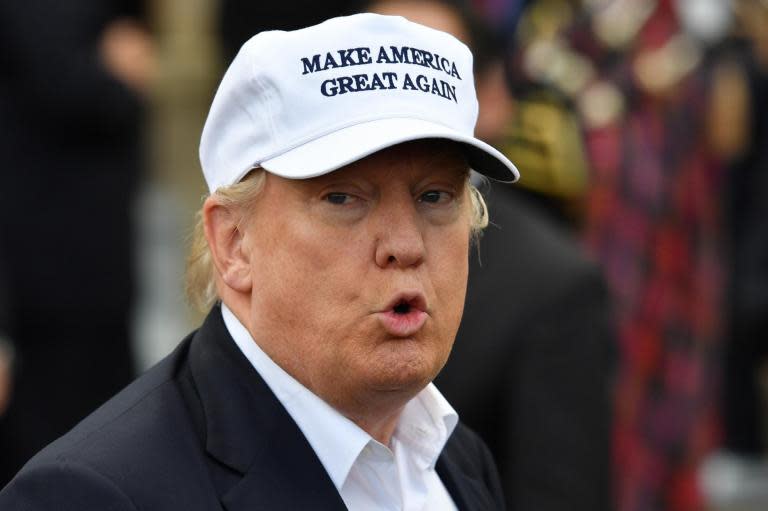Cartoonist Michael de Adder lost work after drawing an offensive image of Donald Trump – but that's his job
Canadian cartoonist Michael de Adder has had his freelance contract with a publishing company cancelled due, he believes, to his depiction of Donald Trump attempting to "play through" on a golf course despite the drowned bodies of migrants Oscar Alberto Martinez and Angie Valeria lying in his path. The company, Brunswick News Inc, deny the sacking was in any way connected to the Trump cartoon, and I have no evidence to suggest otherwise. Yet there is certainly a wider narrative, and seemingly a growing trend, for cartoonists losing their jobs – or worse – for the crime of having caused offence.
It certainly wouldn’t be the first time a cartoonist has been warned off drawing something that his editor thinks might displease "The Donald". In this country, politicians – if they were smart – used to ask to buy the original of any particularly hurtful cartoon, thus both drawing the sting and irritating the cartoonist immensely. This seems to have become rarer in recent years, though whether that says more about modern cartoons or modern politicians I’ll let you decide.
Autocratic regimes are an altogether different kettle of fascists. David Low’s war time cartoons earned him a place on the Nazis' "death list", while today cartoonist Musa Kart remains in jail in Erdogan’s Turkey supposedly on ‘terror-related’ charges. Malaysia’s leading satirist Zunar also suffered years of bans, arrests and detentions for the "sedition" of drawing ex-prime minister Najib Razak in an unflattering manner.
Cartoonist Michael DeAdder was just fired from the newspaper for this cartoon. pic.twitter.com/PhpkH5FbcO
— Jason Chatfield (@Jason_Chatfield)
Those leaders who like to portray themselves as strongmen appear to have the thinnest skins. The more self-inflated the ego the more vulnerable to having its pomposity punctured, and a good cartoon has always been more effective than any article in stabbing a sharp pen into the heart of the matter. It seems Adam Ant was wrong: for Prince Not-So-Charming, ridicule is something to be scared of.
Personally, I’ve always believed if a political cartoonist is not causing offence then he’s just not doing the job right. A political cartoon should be more than just a topical gag; it should have a strong point of view, and an individual voice. If everybody agrees with what you are saying then you’re not saying much at all.
Interestingly, I hardly ever receive criticism for my political point of view. The people who complain about my cartoons almost invariably hold a contrary perspective, but what they choose to criticise is the manner in which I make my point. The cartoons, they say, are vile, obscene, grossly offensive – all cries to suggest they have infringed some law of common decency, and all really designed to close down debate.
As a cartoonist, I work on that margin of what is acceptable: a cartoon needs to unsettle and discomfort the reader a little if it is to penetrate the target and not simply bounce off.
Increasingly people seem to believe they have a right not to be offended, and that anything that more than one person finds offensive should be censored, banned, grovelling apologised for, and the culprit is fired. I, on the other hand, believe everybody should be offended at least once a day, preferably by one of my cartoons. It's good to be unsettled, tipped out of our comfort zones and made to think.
That is not to make an argument for absolute freedom of speech; we all know that one person’s freedom of speech can be misused to curtail another’s. Recently there have been a number of cases where a defence of satire has been used to excuse racist or misogynist remarks, whereas I believe a good creed for the satirist is that they should "afflict the comfortable and comfort the afflicted".
What our comfortable leaders, those we might call the great and good, like to present is a persona spun, tailored and embroidered by a phalanx of image makers. It is the cartoonist’s job to unpick it and reveal the real sordid, naked beast beneath.
Like the little boy in the Hans Christian Anderson story, unafraid to be thought stupid, the cartoonist is the person who points and says: "The Emperor’s not wearing any clothes." Though of course, being cartoonists we feel compelled to add ‘"and he’s got a ludicrously small.…"

 Yahoo News
Yahoo News 

